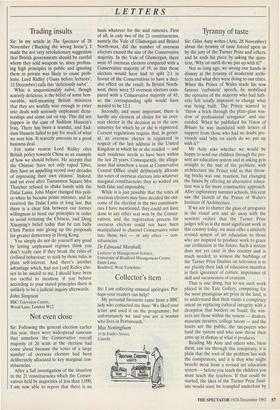Not even close
Sir: Following the general election earlier this year, there were widespread rumours that somehow the Conservative overall majority of 20 seats at the election had come about because the votes of a large number of overseas electors had been deliberately allocated to key marginal con- stituencies.
After a full investigation of the situation in the 21 constituencies which the Conser- vatives held by majorities of less than 1,000, I am now able to report that there is no basis whatever for the said rumours. First of all, in only two of the 21 constituencies, namely the Vale of Glamorgan and Bristol North-west, did the number of overseas electors exceed the size of the Conservative majority. In the Vale of Glamorgan, there were 65 overseas electors compared with a Conservative majority of 19, so that those electors would have had to split 2:1 in favour of the Conservatives to have a deci- sive effect on the result. In Bristol North- west, there were 53 overseas electors com- pared with a Conservative majority of 45, so the corresponding split would have needed to be 12:1.
Secondly, and more important, there is hardly any element of choice for an over- seas elector in the decision as to the con- stituency for which he or she is registered. Current regulations require that, in gener- al, an overseas elector is registered in respect of the last address in the United Kingdom at which he or she resided — and such residence needs to have been within the last 20 years. Consequently, the allega- tions that somehow a team at Conservative Central Office could deliberately allocate the votes of overseas electors into whatever marginal constituencies they so wished are. both false and impossible.
While it is just possible that the votes of overseas electors may have decided the out- come of the election in the two constituen- cies I have mentioned, they could not have done in any other seat won by the Conser- vatives, and the registration process for overseas electors could not have been manipulated to channel Conservative votes into those two — or any other — con- stituencies.
Dr Edmund Marshall,
Lecturer in Management Science, University of Bradford Management Centre, Emm Lane, Bradford, West Yorkshire










































































































 Previous page
Previous page